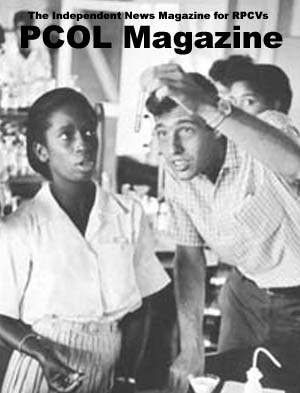
With the best intentions, people go to the developing world to try to help, often lacking the most basic knowledge or tools to accomplish their goals. Sometimes, they can’t even provide shelter or water for themselves, let alone the people they set out to help. The difference between charity and development is widely misunderstood. They are not the same. But this naivety or, perhaps, arrogance, extends into the professional echelons as well. Domestic experts on health, economics, agriculture or the environment, some with stellar achievements to their credit, generally are missing some critical knowledge, that is, an understanding of the foundations of international development. Effective development requires familiarity with the body of learning that has come from 50 years of specialized effort and investment, applying technical expertise in the very different conditions of developing countries.
Jed Meline writes: Those that lead development programs should be required to have a graduate degree in a technical field, with an emphasis on the developing world. In addition, significant practical experience working in the developing world is necessary such as experience in the Peace Corps
Preventing Incompetent Development
by Jed Meline
01.29.2007
AIDS prevention is the same in Kansas City and Kampala.
Urban planning in Chicago is no different than in Shanghai.
Justice system reform is the same in Boston and Baghdad.
Of course not—but for many people it’s easy to assume that American solutions can simply be transferred overseas. This is due in no small part to the fact that there are no commonly respected standards for individuals practicing international development and relief. Under-qualified practitioners have in some cases led to poor development projects, inept use of foreign assistance resources, and the overall detriment of international development as a field. Lawyers have standards established by the American Bar Association, midwives the American Association of Nurse Midwives, physicians, engineers, realtors, even air- conditioning contractors are licensed and have professional associations. All one needs to be “qualified” as an international development practitioner is a passport.
With the best intentions, people go to the developing world to try to help, often lacking the most basic knowledge or tools to accomplish their goals. Sometimes, they can’t even provide shelter or water for themselves, let alone the people they set out to help. The difference between charity and development is widely misunderstood. They are not the same.
But this naivety or, perhaps, arrogance, extends into the professional echelons as well. Domestic experts on health, economics, agriculture or the environment, some with stellar achievements to their credit, generally are missing some critical knowledge, that is, an understanding of the foundations of international development. Effective development requires familiarity with the body of learning that has come from 50 years of specialized effort and investment, applying technical expertise in the very different conditions of developing countries.
International development needs many more brilliant minds to tackle the daunting challenges of poverty, infectious disease, hunger, and natural disasters. By establishing not only a basic minimum standards to enter the profession, but also a clear path of advancement in it, promising and experienced development practitioners can be more easily be identified by companies and non-governmental organizations (NGOs) working overseas. Further, those wishing to enter the field would know what education and experience is required and how to follow that path.
International companies and prominent NGOs with experience overseeing large-scale development programs generally know what to look for on a resume when they are hiring professionals to run their programs. In this way, these organizations self select new members to the echelons of the development profession.
However, in emergencies or rapidly initiated development initiatives, groups not ordinarily involved in development and relief are drawn into action. In some cases, government agencies, companies and NGOs without significant international development or relief experience are designing and managing development interventions without the knowledge of approaches shown to be successful in similar circumstances in the past. Iraq, Afghanistan, and the Indian Ocean tsunami offer recent instances. The international response to the genocide in Rwanda includes some of the better documented examples. It is in no way typical that foreign aid programs are designed and managed by those without knowledge of the fundamentals of development, but it is not uncommon.
You have heard the good-hearted but inappropriate call for medicines, clothes, or food in response to disasters such as the 2004 Indian Ocean Tsunami or Hurricane Mitch. These donated goods go unused and clog distribution channels slowing delivery of critical commodities. In other cases, inappropriate vaccines were recommended for refugees, funding was invested in sophisticated medical equipment that could not be maintained, or road systems were built that spoiled fish breeding sites damaging, rather than strengthening, a local economy.
Though well intentioned, efforts such as these are sometimes uninformed by the best practices (or historical failures) of international development. As a result, mistakes of the past can be repeated and what is already well-documented by the international development community has to be relearned. When this happens, scarce resources are squandered, credibility for the profession is diminished, and, most importantly, the developing countries themselves continue to suffer needlessly as a result.
With accepted minimum standards for knowledge and experience, the field of international development could rise in stature and begin to establish itself as a “profession.” Practitioners typically develop standards themselves through associations and, over time, some standards have become de facto or even legal requirements.
Those that lead development programs should be required to have a graduate degree in a technical field, with an emphasis on the developing world. In addition, significant practical experience working in the developing world is necessary. For entry-level professionals, this might entail experience in the Peace Corps, with the Jesuit Volunteers International, or other similar groups. Cross-cultural experience is also vital to begin to understand the context within which development must occur. Additional standards or criteria may also be appropriate depending on the specialty of focus. For those who have been working in international development for many years, sufficient field experience would substitute for an appropriate advanced degree.
To achieve the lofty goals of international development and ensure the greatest likelihood of success for foreign assistance and reconstruction programs, it is incumbent upon the development community to establish professional standards. In this way development practitioners themselves can ensure that only properly experienced and qualified people manage the scarce development resources available today and thereby improve the standing, credibility, and future success of this noble profession.
Jed Meline is a career Foreign Service Officer with the U.S. Agency for International Development. He has previously served as the director for Health and Humanitarian Assistance at the National Security Council; at the State Department and USAID headquarters; and has led development efforts in Tanzania and the Philippines. The views presented in this article are those of the author and do not necessarily represent those of the U.S. government.


















